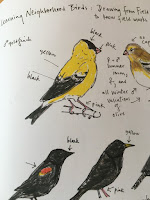 |
| Family Nature Journal Option 3 |
"By September, the day breaks with little help from birds. A song sparrow may give a single half-hearted song, a woodcock may twitter overhead en route to his daytime thicket, a barred owl may terminate the night's argument with one last wavering call, but few other birds have anything to say or sing about.
It is some, but not all, of these misty autumn daybreaks that one may hear the chorus of the quail." – Aldo Leopold, from "The Choral Copse"
For those interested in the outdoor learning movement, so much energy obviously needs to be placed in continuing to provide positive engagement, slow time, and activities built around a hopefully newfound daily connection with nature. But it is also important sometimes to take a wide lens look at that list of things that seem to prevent us from turning our own homes to nature centers. Some obvious preventers are simply time and energy, a busy schedule and sometimes nothing more than a lack of interest. Another that comes up, especially as we begin to create our own curriculums, is that there is always a question whether we are really enough of naturalists ourselves? Are we experts or just novices? And if just novices, are we really qualified to begin this project of prioritizing "green time over screen time?" The answer is absolutely, without a doubt, yes. To start with a very simple human argument, we all are born with the right to a connection with nature, whatever that comes to look like. As mentioned in first Family Journal post, this project is going to take as many shapes as there are families. Some families are musical, others athletic, some in business, some in non-profit. There are entry points to outdoor
learning for every avenue of interest imaginable. Any trained naturalist will hopefully tell you that even though they have expertise in a particular field or two, or that they might have a strong and broad knowledge of the outdoors, the truth is, there is no way to be an expert in all things natural. And that this information and training is not exclusive to anyone. If we were commissioned to write scholarly articles, or create lab documents then, yes, we need expertise. What we are going for instead is something far more accessible and familial: time spent outside, seeing natural images instead of artificial, and re-learning about a world outside of our making, one that we are significantly a part of. In a way, the outdoor learning movement will come to mean learning about oneself more wholly, more balanced, as a result of getting to know reality again, the river, the park, the bird, the bat, the sound of the wind, the unusual flying pattern of the Monarch. Those things are not something separate from us and only known by an expert. In fact, they are you and you are them. This understanding needs practices and time.
Family Journal Option 3: Become your own expert. Writing is a powerful tool for understanding things. We have thoughts we carry around, but they are often fleeting and hard to grasp, much like the butterfly mentioned above. Writing is a sort of test of what you really think. Very short pieces of writing, one sentence, a tweet, etc., only capture the kind of short thoughts we carry around with us that are fleeting and untested. If we only stick with the short responses, unfortunately we can never really come to know what we think. To write a page about something can seem an insurmountable task sometimes, especially if we haven't done it. But the rules are that everyone can write, everyone can think, and everyone has a right to a connection with nature. These are all permission slips to becoming an expert on something natural.
Take a 20 minute walk around the block, to the park, to the close hiking trail, and take either mental notes or written notes on three things that seem to stand out in nature. What are your impressions? What do you already know about this tree, this bird, this blade of grass, this prairie flower? If you don't know, guess for now. You can research later. Sit inside and write one page, as an expert, about one of these three subjects. Use Leopold's line, "By September, the day breaks with little help from birds. A song sparrow may give a single half-hearted song, a woodcock may twitter overhead en route to his daytime thicket," as inspiration, placing yourself within your month, your day, and any natural pattern you can think of. Don't stop to think too much -- there is no expert watching. Try this everyday for a week.

No comments:
Post a Comment